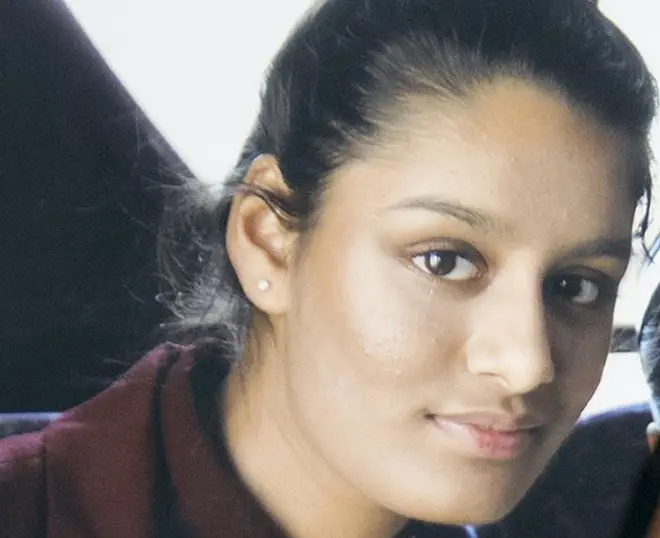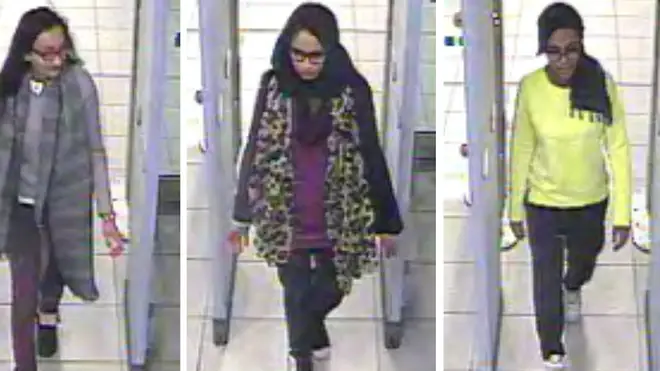
Matthew Wright 7am - 10am
24 November 2020, 18:48 | Updated: 24 November 2020, 19:03

The "only effective means available" of ensuring Shamima Begum has a fair appeal against the removal of her British citizenship is to allow her to return to the UK, the Supreme Court has heard.
Ms Begum's British citizenship was revoked on national security grounds shortly after she was found, nine months pregnant, in a Syrian refugee camp in February last year.
She was only 15 when she left the UK for Syria with two other east London schoolgirls to join the so-called Islamic State group (IS).
Ms Begum, now 21 and currently in the al-Roj camp in northern Syria, is challenging the Home Office's decision to remove her British citizenship and wants to be allowed to return to the UK to pursue her appeal.
Read more: Shamima Begum returning to UK 'poses security risk', Supreme Court told
Her barrister, Lord Pannick QC, told the court that the Government "cannot maintain a decision to deprive Ms Begum of her citizenship unless a means can be conferred on her, without unreasonable delay, (to have) a meaningful opportunity to appeal".
"Leave to enter (the UK) is the only effective such means available," he added.

Lawyer says Shamima Begum case has 'wide implications' for IS brides
The latest legal battle follows a ruling from the Court of Appeal in July, which said that "the only way in which she can have a fair and effective appeal is to be permitted to come into the United Kingdom to pursue her appeal".
But the Home Office argues that allowing her to return to the UK "would create significant national security risks" and expose the public to "an increased risk of terrorism".
The former head of the Metropolitan Police's counter terrorism command told LBC earlier this year that she would likely to face arrest and a subsequent terror trial if she took up the opportunity.
On the second day of a remote hearing on Tuesday, Ms Begum's lawyers argued that she "cannot play a meaningful part in her appeal" from the refugee camp run by the Syrian Democratic Forces, which "do not permit visits from lawyers nor do they permit detainees to speak to lawyers".
Read more: Shamima Begum case has 'wide implications' for other IS brides, lawyer tells LBC
Lord Pannick argued that the case against Ms Begum was "no more than that she travelled to Syria and 'aligned with IS'".
"It is not alleged that she fought, trained or participated in any terrorist activities, nor that she had any role within IS," he said.
"It is not said that she has expressed or harbours any ill will against the United Kingdom."

On Monday, Sir James Eadie QC, representing the Home Office, argued that allowing Ms Begum to appeal in the UK would "create potentially very serious national security concerns".
He told the court: "She married an IS fighter, lived in Raqqa, the capital of the self-declared caliphate, and remained with them for about four years until 2019, when she left from, in effect, the last pocket of IS territory in Baghuz."
In written submissions, Sir James said: "This case raises questions as to the balance to be struck between degrees of protection of procedural rights and degrees of protection of the public from terrorism.
Read more: Isis bride Shamima Begum ‘highly likely’ to face arrest on her return to UK
"Can it be right that a person who has involved themself in terrorism, and is now abroad and subject to restrictions that affect their ability to participate in domestic proceedings, is able to rely on those self-created impediments to insist on return to the jurisdiction to enable them to participate now in such proceedings?
"Can it be right that they should be able to do so if enabling them to do so runs directly contrary to the most effective protection of the public from the risks of harm through terrorism?"
At the conclusion of the two-day hearing on Tuesday, the Supreme Court's president Lord Reed said the court would deliver its judgment at a later date.